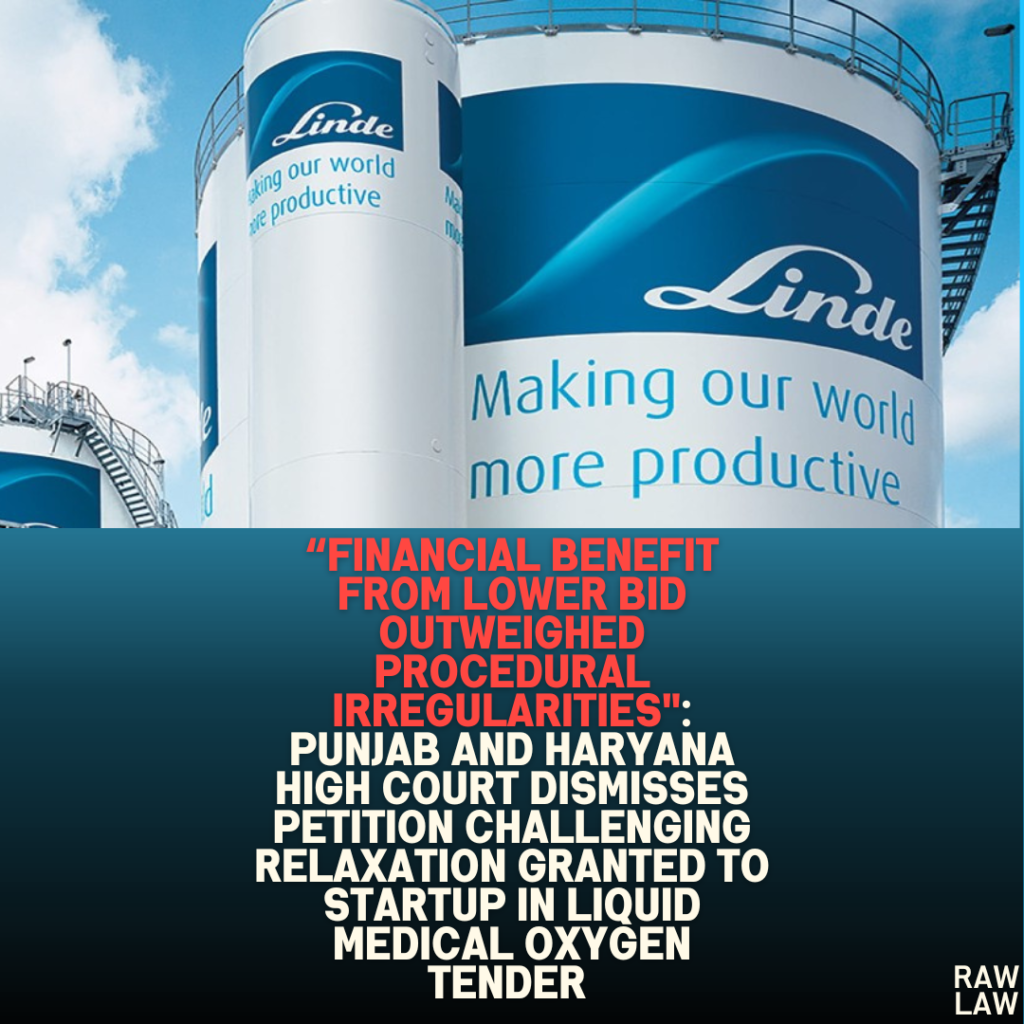Court’s Decision: The Punjab and Haryana High Court dismissed the writ petition filed by Linde India Limited, challenging the award of a liquid medical oxygen (LMO) supply contract to a startup (respondent No. 5). The Court upheld the relaxation granted to the startup by PGIMER, Chandigarh, despite the absence of explicit provisions for such relaxation in the tender document. The decision was based on the General Financial Rules, 2017 (GFR 2017), and the public interest in securing the lowest bid, which resulted in significant savings for PGIMER.
Facts of the Case: The petitioner, Linde India Limited, a leading supplier of medical gases, objected to the award of the LMO supply contract to respondent No. 5 by PGIMER. The tender floated in November 2022 set specific eligibility criteria, including a minimum of 10 years of experience and an annual turnover of ₹200 crores. The petitioner argued that respondent No. 5, incorporated in 2021, did not meet these requirements, but PGIMER granted it relaxation based on its status as a startup.
Issues: The primary issue was whether PGIMER’s decision to relax the experience and financial criteria for respondent No. 5, without explicitly stating such relaxation in the tender document, was lawful and justified.
Petitioner’s Arguments: The petitioner contended that PGIMER’s decision to relax the eligibility conditions for respondent No. 5 violated the terms of the tender, as no such relaxation was mentioned. The petitioner also argued that respondent No. 5 did not meet the financial and experience criteria, making the award of the contract arbitrary and illegal.
Respondent’s Arguments: PGIMER and respondent No. 5 defended the relaxation granted under the GFR 2017, which allows for relaxation of experience and turnover criteria for startups. They emphasized that a technical committee had found respondent No. 5 capable of meeting PGIMER’s LMO demand, and the decision to award the contract to respondent No. 5 resulted in savings of ₹5 crores.
Analysis of the Law: The court examined Rule 173 of the GFR 2017, which provides for relaxation of eligibility conditions for startups in public procurement. Although the tender document did not explicitly mention such relaxation, the court found that the decision-making process was transparent and in the public interest, as the relaxation was consistent with the GFR 2017 and intended to promote startups.
Court’s Reasoning: The court held that PGIMER’s decision to relax the tender conditions was not arbitrary or mala fide. The relaxation was granted in accordance with the GFR 2017, and the financial benefit to PGIMER from accepting respondent No. 5’s lower bid outweighed any procedural irregularities. The court also noted that respondent No. 5 had been successfully supplying LMO to PGIMER since being awarded the contract.
Conclusion: The court found no merit in the petitioner’s claims and dismissed the writ petition, allowing the contract with respondent No. 5 to continue. The decision emphasized the limited scope of judicial review in tender matters, especially when public interest and financial considerations are at stake.
Judgments Cited:
- Agmatel India Pvt. Ltd. v. Resoursys Telecom (2022)
- Jagdish Mandal v. State of Orissa and Others (2007)
- Bharat Coking Coal Ltd. v. Amr Dev Prabha and Others (2020)
- Vidarbha Irrigation Development Corporation v. M/s Anoj Kumar Garwala
This judgment underscores the court’s reluctance to interfere in administrative decisions involving public procurement unless clear evidence of arbitrariness or mala fide intent is presented.




Pingback: Delhi High Court Dismisses Appeal for 4486-Day Delay: "Corporate Entities Must Exercise Higher Diligence Compared to Individual Litigants; Mere Counsel Negligence Does Not Justify Delay" - Raw Law